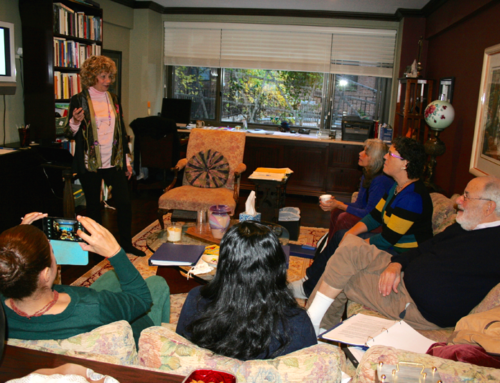At the time of this writing, The Museum of Modern Art in NYC is running an exhibition called Soundings: A Contemporary Score. Artists deconstructed sound and made it visable in a variety of ways.
What interested me most were the artistic contributions that made silence audible. In one case, what a dog can hear was brought within the human range. In another, the “silence” of a desolate room in an abandoned building was magnified by recording the silence, recording over the first segment, and superimposing recordings again and again, until the silence was shown to be full of auditory events—still subtle, but obvious nevertheless.
And so it is within us. The literal-minded might say, “Sure, I can hear my bones creak or crack, my stomach gurgle or my heart beat. If I hold my ears closed I can hear a steady hiss or thump of blood coursing through my veins. But to listen to an “inner silence”—bah, humbug!”
Not so fast! The mind, body, and spirit conspire to give us important information—subtle, but obvious nevertheless. You stand to gain if you can find patience and trust to give it a go.
The barrier to believing that there is much to be gained by tuning in to our inner silence is our conscious mind. It is set in its ways. When we threaten to voluntarily change things, our conscious mind gets noisy, defensive, judgmental, and critical. It locks into a linear, literal but uncreative way of thinking and that’s that!
Our unconscious mind is quiet, flexible, curious, and creative. If you are willing to put the conscious mind in suspended animation (knowing that it will refuse to be silenced and will continue to squawk for a while at least) your unconscious mind will reveal options and possibilities that you haven’t thought of—in its way. It whispers. And like the barren silent room, if you listen, it will speak its wisdom to you.
Here are two tips that will help you tame your conscious mind and launch an ability to hear that inner silence:
- Follow your breath, no matter how fast or slow, ragged or steady. You are likely to lose your place. Just say, “oops” and return to your breath until you “boss” your conscious mind, which will continue to judge and complain, into submission. Despite this protesting, you can give the creativity and intuition of your unconscious mind an opportunity to have its say if you simmer your nervous system down with breath awareness. Breath awareness is tranquilizing.
- Engage your senses – sight, hearing, touch. Imagine visualizing, hearing or touching anything with which you most resonate. “Take yourself” to the beach, a garden, a mountain top, the forest …. What do you see? Really notice the details. What do you hear? Savor the sounds. What can you touch, enjoying sensuous pleasure through your fingers? We are wired to experience our imaginings as real because our limbic brain doesn’t know that we are not where we imagine ourselves to be. And you can pay attention to feelings that are evoked for an even richer, deeper experience.
Whether you create the opportunity to focus on your breath (your nature) or enjoy the sensuousness of nature herself, you enter a sanctuary into which you can retreat from the demands of your life. In the process you get to retreat from the mental, physical and spiritual experiences of stress.
When we are dealing infertility or with any challenging adversity, creating a hiatus from stress by creating an oasis into which you can enter may very well be as good as it gets. And it is more valuable than you may think.
Helen Adrienne, LCSW, BCD
© August 2013






